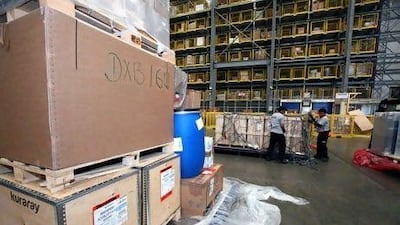Officials hope to agree this year on how customs revenue will be distributed between GCC states in a deal regarded as an important step in boosting regional trade.
Differences have for years delayed the creation of a system to transfer customs receipts fairly among members.
"At one of the next meetings the magic formula will be reached," said Abdel Aluwaisheg, the director general for international economic relations at the GCC.
Since it was set up in 2003, the GCC customs union has been credited with helping to treble trade to US$90 billion (Dh330.57bn) last year.
Members agreed on a common set of tariffs for exports - 5 per cent for 90 per cent of goods and no fees on other products.
But officials say the process by which such money is distributed between states is unnecessarily cumbersome.
At the moment, country representatives have to meet every three months to settle outstanding invoices.
Instead, officials want to set up a common fund into which all revenues are pooled and then redistributed to members based on their share of trade.
In a meeting in Riyadh on Saturday of the financial and economic committee of GCC, chaired by the UAE, a deal was reached about how to share funds. But how to determine the formula to control the distribution remains a sticking point.
Involved in a large proportion of regional trade, UAE officials want to ensure they receive their fair share of receipts.
"A lot of procedures will be discussed to decide how to distribute the funds," said Majed Omran, the director of the international financial relations department at the UAE Ministry of Finance. "There may be an agreement in 2011."
A customs union, a form of trade bloc, involves countries agreeing on common external trade policy to increase efficiency and forge close ties. Such a union was one of the EU's earliest achievements.
In the GCC's case, moving towards an economic bloc similar to the EU is a priority for only four members: Saudi Arabia, Qatar, Kuwait and Bahrain. The UAE and Oman have pulled out of plans to create a regional single currency.
But the Emirates has been one of the frontrunners in achieving another element of closer economic collaboration: the GCC common market. UAE officials say they have been more active than others in opening their economy to GCC nationals and companies.
"[The] UAE is keen to activate GCC economic integration and support GCC common projects and their diversification to serve all member states' economies," said Obaid Humaid al Tayer, the Minister of State for Financial Affairs.
GCC customs union officials will hold a further meeting next month to discuss plans for the ratio to distribute custom revenues. Talks will also cover how to co-ordinate border checkpoints between countries.
The results will then by submitted to a summit of the Supreme Council of GCC leaders in Riyadh in May.
Abdulrahman al Attiyah, the GCC secretary general, at Saturday's meeting stressed the importance of the customs union, especially after recent unrest in parts of the Mena region.

